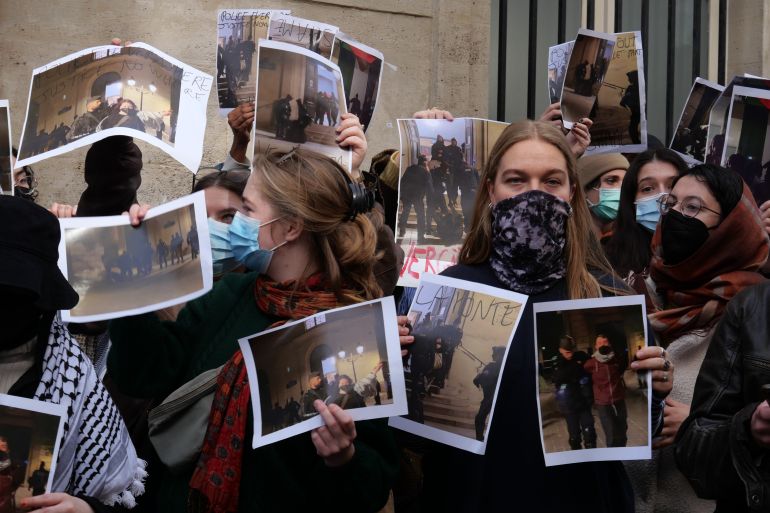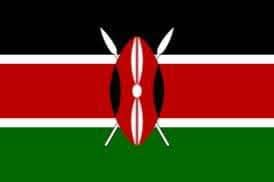Madaxweyne Donald Trump ayaa amray in ciidamada Mareykan ah loo diro magaalada Portland ee gobolka…

France deploys riot police, cuts funding to quell campus protests over Gaza
Al Jazeera
Published: April 30, 2024, 3:56 PM(EAT)
Campus sit-ins upend Sciences Po and Sorbonne in Paris as students decry Israel’s ‘genocide’ and university partnerships.
Tensions are rising between the French state and students at top universities who are staging pro-Palestine protests amid Israel’s war on Gaza, inspired by their American counterparts.
Students at the Sciences Po university in Paris occupied parts of the institution and blocked entry to a building last week before riot police descended on campus.
On Saturday, Prime Minister Gabriel Attal, who like President Emmanuel Macron is among the university’s notable alumni, said his government “would not tolerate the actions of a dangerously acting minority trying to impose its rules and an ideology coming from North America”, following the three-day blockade at the prestigious school.
On Monday, undeterred by the threat of police action, antiwar protesters at the renowned Sorbonne University demonstrated on campus, setting up tents, chanting and waving the Palestinian flag.
Valerie Pecresse, president of the Ile-de-France region in which Paris is situated, has announced that the region’s funding for Sciences Po Paris will be cut until “serenity and security are restored in the school”.
The Sciences Po protesters occupied part of the campus first on Wednesday after 100 students voted to pitch tents on the university compound.
As well as an end to Israel’s war, they called on their university to cut ties with Israeli institutions and other businesses they see as complicit in the war in Gaza that has to date killed about 34,500 Palestinians, mostly children and women.
Hours after the demonstration began, the interim president of the school, Jean Basseres, summoned riot police officers, a move that carried significance in France as police rarely set foot in universities.
Despite no arrests being made, the president’s decision crossed a red line, according to some students and faculty. The protest continued on Thursday with some camping overnight.
“[University officials] told us that we could get expelled, that the director would call the riot police officers inside again, that we wouldn’t get our diploma,” said Ismail, a master’s student at Sciences Po who joined the sit-ins, as he decried “intimidation tactics”.
“Personally, I am not scared. Potentially, I will have to face disciplinary sanctions from a university that is complicit in genocide. If that’s something that I have to put on the line, I will do so,” he told Al Jazeera.
He believes his school has “failed to meet the moment when it comes to condemning the ongoing genocide in Gaza and cutting partnerships with complicit universities and businesses”.
Sciences Po has partnerships with several Middle Eastern universities, including Tel Aviv University in Israel, while some under and postgraduates’ study in exchange programmes in Israel.
‘France doesn’t want a Columbia encampment here.’
Eliana*, a French American student who requested anonymity for security reasons, believes the French government pressured university officials to let security forces in.
“In my first meeting with the [university] administration during the occupation on Wednesday, a member of the administration received a phone call and was told to do everything to get us out of the university, as the government was putting pressure”, she recalled.
“My analysis is that the government didn’t want a Columbia [University-style] encampment here in France, they didn’t want to be faced with that image”, she told Al Jazeera, referring to the protests at the US university that have made global headlines.
Thousands have joined pro-Palestine protesters at Columbia, an Ivy League university, and several other US schools. Hundreds have been arrested while some have been suspended from their courses.
“Sciences Po thought it was acceptable to call the cops on their own students. We are in utter disgust at this decision, but we also have a stronger resolve to push for our demands,” said Eliana.
That Sciences Po Paris was the first university in France to hold a days-long protest for Palestine on campus is “highly symbolic”, according to Ziad Majed, a professor at the American University of Paris and a specialist in Middle East politics.
“Sciences Po is considered by the French government as a sacred place, whose role is to produce the elites of the country. A counter-model has emerged inside this elite institution, which is very worrying in the eyes of the establishment,” he told Al Jazeera.
He said the decision to call in riot police is unsurprising given France’s position on Israel-Palestine since October 7, when the historic conflict sharply escalated.
On that day, Hamas, the Palestinian group which governs Gaza, attacked southern Israel. During the assault, 1,139 people were killed and more than 200 were taken captive. Dozens of Israelis are still held.
“At the beginning, France’s position had been one of unconditional support to Israel, while President Macron was claiming that he wanted to avoid an ‘importation of the conflict’ in France,” said Majed.
“The government is very scared that these students’ protests could spread to other French universities and is thus trying everything in its power to avoid that.”
The drama at French universities coincided with other societal frictions related to the Middle East war.
Last week, police summoned several public figures accused of inciting “terrorism”, including Mathilde Panot, president of the left-wing party La France Insoumise (France Unbowed), and journalist Sihame Assbague, over their statements made after the Hamas attacks.
Assbague posted on social media in the aftermath, writing: “The only one responsible: the colonial state of Israel. The only solution: The end of colonization and the liberation of Palestine. The only political path: to talk about the causes of the perpetuation, in a word, colonization, and violence, to condemn the complicit states and to support the Palestinian resistance.”
Panot leads LFI, the parliamentary group of France Unbowed, which on October 7 cast the Hamas assault as an “armed offensive by Palestinian forces” and referenced Israel’s occupation.
Majed said the police summons represent a “threat to public freedoms” and are part of a “repressive ambient climate”.
“All of this is happening while extreme-right rhetoric is on the rise in France, and while anti-Palestinian as well as anti-Arab racism have become normalized in the media and political scene.
“But French civil society, at the forefront of which are students, are resisting and denouncing those abuses, which is scaring the government.”
While France has previously banned pro-Palestine rallies, Macron has more recently called on Israel to stop killing civilians in Gaza.
On Friday, Sciences Po protesters met with university officials and agreed to hold a town hall meeting during which students will be able to express their concerns.
The university director also agreed to discard disciplinary proceedings against several students engaged in the protests.
“It is not yet a victory, but it gave me hope,” said Ismail, who added that students plan to hold the university “accountable” by trying to end the school’s partnerships that are “complicit with genocide”.
“[We will also] push other universities to join the fight for Palestine,” he said.



This Post Has 0 Comments